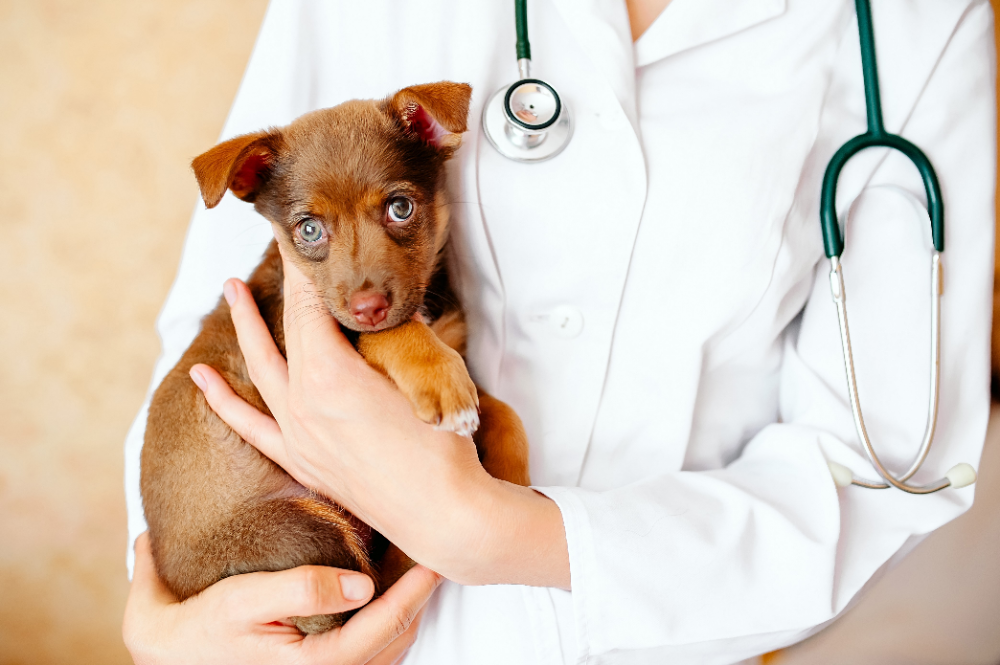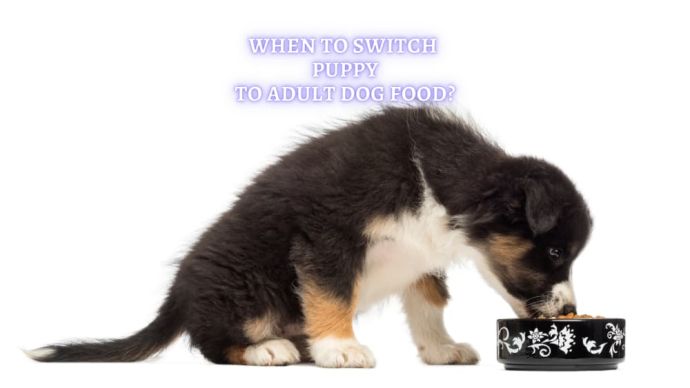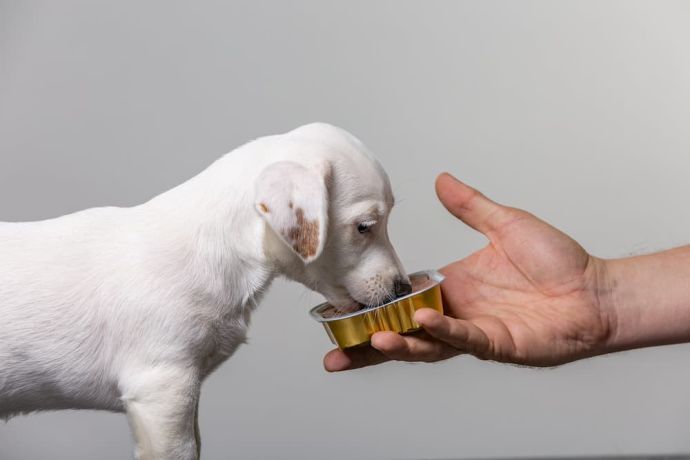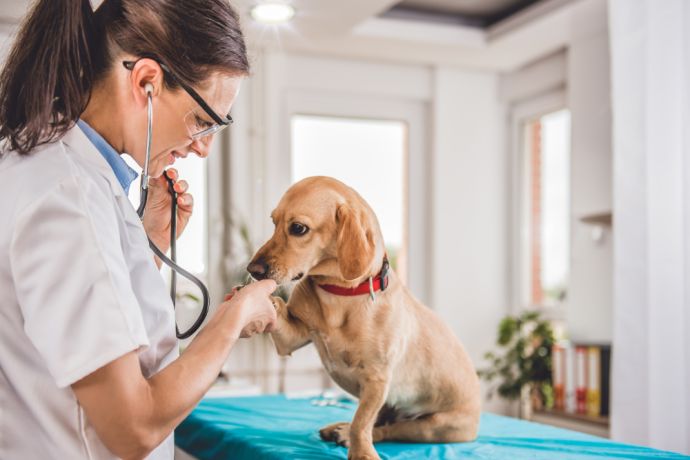Sick Puppy 101: How to know if your Puppy is Sick? (Vet Advice)
Written by:
Author: Dr. Joanna De Klerk
Dr. Joanna de Klerk is a professional Clinical Veterinarian. Member of the Royal College of Veterinary Surgeons UK and a member of the South African Veterinary Association. Graduated with a Master of Science in Tropical Animal Medicine in 2018. Professional author, she has been writing in scientific journals, and also several book series. Joanna loves to enjoy time with her young daughter and family in her free time.
View all 10 articlesLearn about our editorial process and veterinary review board.
Viewed: 1438
Updated on: 06/15/2021
It can be a worrying time when your puppy is sick, as he is still very young. Younger dogs do not cope well with being sick, and therefore treating your puppy like you would treat an adult dog is not always the right thing to do. Treating a sick puppy can be tricky, and therefore it is best to seek advice from your veterinarian before treating the problem at home. But sometimes, it can also be tricky to even know if your puppy is sick; puppies can act in strange ways, and since they cannot communicate with you, figuring out whether their strange behavior is normal or abnormal is not always easy. In this article, we will look at how to recognize whether your puppy is sick and what to do.
Signs of a Sick Puppy
Knowing whether something is wrong, and being on the lookout for signs, will help you pick up on illness early. This is essential for puppies, as they can go downhill very quickly.
The following sick puppy symptoms are indicators of illness:
1. Lack of energy
All puppies sleep a lot as it is vital for their development, but if your puppy is so lethargic that he does not have occasional bursts of energy, playfulness or energy to get up and explore, this could be a sign that he is not feeling well.
2. Inappetence
A lack of appetite can be for plenty of reasons, and not all of them are related to illness. Puppies can stop eating because they are anxious, or because they are simply being fussy. But it can also be because they are feeling nauseous or have a temperature.
3. Digestive upsets
Puppies are prone to having digestive problems, such as vomiting and diarrhea. Puppy might still be bouncing around and acting normal, but vomiting and diarrhea are never normal and can lead to rapid dehydration.
4. Whining
Making noises such as whimpering and whining are signs that your puppy might be feeling uncomfortable.
5. Licking, scratching or nibbling
Some puppies scratch a lot when they first have a collar put on, but this should not last long. Licking, scratching or nibbling any other areas of the body are all signs that your puppy’s skin is itchy or sore.
6. Ataxia
Also known as dizziness or wobbliness, ataxia can be a serious symptom. If your puppy looks drunk, you must take him to your vet immediately.
What common problems do Puppies get?
A puppy can get sick from a huge variety of problems. There are many diseases that any age dog can contract and plenty of which only puppies develop. There are three categories of problems which a puppy may develop that will require veterinary treatment:
Congenital diseases
These are diseases which are not infectious, but are linked to your puppy’s genetics. Many congenital diseases stem from inbreeding, and therefore buying a puppy from a responsible breeder will ensure that many genetic problems have been tested for before breeding. Some examples of congenital diseases include joint dysplasia of the hips and elbows, breathing difficulties brachycephalic (short-nosed) dogs, and epilepsy.
Infectious diseases
Because puppies are still developing their immune system, if they haven’t come across an infectious disease before, they may be susceptible to contracting it. Infectious diseases can range from being mild to severe, and therefore should not be underestimated.
Traumatic problems
Since puppies are inquisitive and enthusiastic, they are more prone to traumatic events such as running into the road and being hit by a car, or chewing an object they find and getting pieces lodged in their intestines.
Should I be worried if my Puppy vomits or has diarrhea?
Vomiting and diarrhea are common symptoms for a puppy to develop. They may be simply caused by a change in food or stress, but they can also be caused by viral, bacterial, or parasitic infections. Puppies need their nutrients to grow, and vomiting and diarrhea can reduce the nutrient absorption from the guts. Also, puppies can become dehydrated very quickly. Therefore, treating vomiting and diarrhea should be considered important, even if your puppy is bright and bouncy. Your puppy will need a visit to the vet for treatment if he has vomiting or diarrhea for more than 24 hours, is lethargic, or is off his food.
READ MORE: Best Puppy Food
How do I know if it is urgent to take my Puppy to the vet?
Puppies can rapidly deteriorate if they are sick, as their body cannot cope with the stress of being ill; their blood sugar levels rapidly decline and their immune systems are not developed enough to fight off infections as an adult dog can. Therefore, all sick puppies should be taken to the vet for a check over to receive treatment early and prevent deterioration.
If your puppy is lethargic, vomiting continuously, not eating or has pale pink or white gums, it is particularly urgent to take him to the vets, as these are symptoms that can indicate something serious.
What can you give a Sick Puppy?
It is best not to self-medicate your puppy, as many drugs that are given to adult dogs cannot be given to puppies. Therefore, even if you are used to giving a certain medication to your older dog, do not assume that it will work for your puppy if he has the same symptoms. It might even be detrimental. Leave the medication up to your vet to decide on.
Puppies should always be given supportive nutrition, such as easily-digestible food and rehydration fluids when they are ill. These can be purchased over the counter at your vet. Other than this, you should always seek the advice of your vet before giving your puppy anything, even if it is just a phone call.
READ MORE: How to tell how old a Puppy is
How do I prevent my Puppy from Getting Sick?
Preventative health care is vital to prevent your puppy from becoming ill. Vaccinations will help prevent your puppy from contracting several deadly diseases including:
Distemper
This disease is a virus that can be devastating. It can cause non-specific symptoms, such as sneezing, vomiting, and coughing. It can also cause the hardening and thickening of the pads on the paws and of the nose. It rapidly progresses to death.
Parvovirus
This is also a virus that typically affects young puppies. It causes bloody diarrhea, which is extremely contagious. This gradually causes puppies to fade due to dehydration and blood loss.
Leptospirosis
This disease is a bacterium with several serotypes. Different vaccines cover different serotypes, and so you should enquire which vaccine your vet uses. Leptospirosis causes failure of the kidneys and liver, and the most common symptom is yellowing of the gums and eyes, known as jaundice. Some dogs also display neurological symptoms.
Hepatitis
This is a virus, otherwise known as canine adenovirus, which like distemper causes some vague symptoms. Commonly seen are fatigue, fever, vomiting, diarrhea, and jaundice, and it will rapidly lead to death.
Parainfluenz
It is sometimes contained in the injection which combines the four diseases already mentioned, or it can be part of the kennel cough vaccine. Parainfluenza is a virus, which can lead to a debilitating cough.
Kennel cough
This is a vaccine that contains Bordetella and Parainfluenza. Together they create a complex disease known as kennel cough. It is highly contagious and causes a honking cough and a fever. This vaccine is squirted up the nose rather than injected.
Rabies
This injection should be given as standard to any dog which lives in a rabies endemic area. It is a dangerous disease that causes aggression, hypersalivation and neurological symptoms, which lead to death. If a rabid dog bites a human, they also may contract the fatal disease.
Vaccinations must initially be given two or three times, several weeks apart, when your dog is a puppy, as this is required to build up the immunity to a sufficient level. This is because puppies still have antibodies from their mothers’ milk, which can interfere with the vaccines taking full effect from just one injection. After the initial puppy course, they can be given once a year.
Read more about puppy vaccines in What shots do puppies need and when?
Preventative health care also includes parasite prevention which can also be bought from your vet. Puppies are extremely susceptible to roundworms and tapeworms and should be given de-wormers every two weeks until they are twelve weeks old. After that, they can be dispensed monthly until six months, and after that, every six months. Most de-worming products come in the form of tablets or chew treats.
Your puppy will also need flea prevention and depending on your geographical location, tick prevention too. These can come in a variety of forms with differing lengths of effectiveness. Sprays, shampoos, spot-on pipettes, tablets, collars, and chews are all options to suit your particular lifestyle.
READ MORE: How to Take Care of a New Puppy
Conclusion
Getting your puppy’s health right early on in life will set him up for healthy development and future, therefore if your puppy is showing signs of sickness, it is important to consult your veterinarian straight away. Early intervention prevents deterioration and always results in the best outcome.
 Dog Veterinary Tips Why is my Dog throwing up: Causes and Preventing (Veterinary Advice)
Dog Veterinary Tips Why is my Dog throwing up: Causes and Preventing (Veterinary Advice) - 23424
- 5
 Dog Care Why Is My Dog Bleeding From Its Butt? Causes and treatment of rectal bleeding in the dog
Dog Care Why Is My Dog Bleeding From Its Butt? Causes and treatment of rectal bleeding in the dog - 22076
- 0
 Dog Care My Dog Keeps Scratching His Mouth: Reasons Why Your Dog Scratching Face
Dog Care My Dog Keeps Scratching His Mouth: Reasons Why Your Dog Scratching Face - 17561
- 1


























